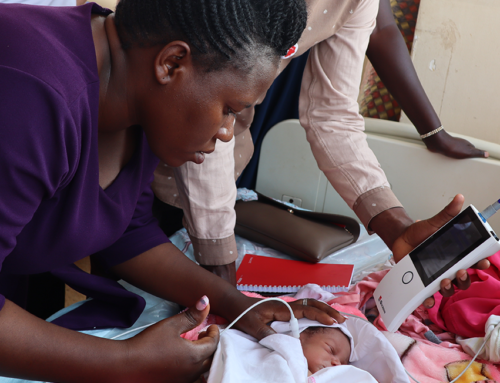Cytomegalovirus: most common cause of congenital, non-inherited, progressive hearing loss.
One of the possible causes of congenital hearing impairment is prenatal infection with cytomegalovirus. Therapy should take into account other symptoms that affect the ability to communicate; preventive hygiene during pregnancy can avoid infections.

For healthy children or adults, cytomegalovirus, aka CMV, is harmless. If at all, the pathogen from the herpes virus family becomes noticeable through flu-like symptoms. As with cold sores, chickenpox or shingles, however, the virus remains in the body and can be reactivated if the immune system is weakened. Individuals with defective immune systems can contract pneumonia or hepatitis from CMV.
CMV is particularly dangerous to the unborn: CMV infections in the womb are - along with Down syndrome - one of the two most common causes of congenital impairment worldwide, including hearing impairment and other communication disorders. The hearing, speech and communication development of infected children should be constantly monitored and therapy should be holistic.
Disabilities as a consequence of such a connatal infection (cCMV) are more frequent than disabilities as a consequence of rubella infection, HIV infection or alcohol abuse; it is also more frequent than sudden infant death syndrome (SIDS). Unlike these, however, the virus and its consequences are little known. Even increased hygiene during pregnancy could considerably protect the unborn child!
Connatal CMV infection can cause hearing loss!
In every second to third pregnant woman infected with CMV for the first time, the pathogen is passed on to the unborn baby; the risk is somewhat lower with reinfections. Infected children can remain completely asymptomatic. However, one in ten infected babies shows symptoms at birth: Jaundice, underweight, pneumonia, poor liver function, fever, inflammation of the brain, seizures.
Sixty percent of these newborns with symptoms are left with serious, permanent mental or physical impairments, including hearing loss and even deafness. Balance problems and feeding problems are also typical. The risk for severe, permanent damage is especially high if the infection occurred during the first trimester of pregnancy. However, even 10 to 15 percent of symptom-free newborns with cCMV lose their hearing during childhood.
cCMV-related hearing loss can occur on one or both sides, simultaneously or delayed on the second side. If there is no hearing loss in the early years of life, the infection will not affect the ability to hear even in later years; however, even affected individuals with a completely normal hearing threshold often have less verbal expression as adults, and the cognitive abilities necessary for communication are often reduced.
Hearing impairment is compounded by other problems in communication
"Hearing impairment is not the real problem!" complain the parents of a bilaterally CI-provided schoolchild who was deafened as a result of a CCMV infection. CI children whose deafness is caused by cCMV usually develop speech comprehension more slowly. This may be related to other symptoms that can occur as a result of cCMV: delays in vocabulary development independent of hearing, attention deficit hyperactivity disorder (ADHD), reduced impulse control or attention span, cognitive delays, or motor dysfunction. Affected individuals may have difficulty understanding long or complex sentences. All of this has a significant impact on school careers and on the ability to engage in social communication.
In a Swedish survey, parents of affected children therefore call for the individual symptoms not to be treated independently of each other, but for the cCMV infection as the underlying cause to be given increased focus in therapy. Regular hearing checks should be performed in affected children; all symptoms that may affect communication should be observed - including cognitive ability tests.
Frequency of cytomegalovirus: highly variable
CMV and cCMV infections are more common in developing countries than in developed countries. High numbers are recorded especially in Brazil and Africa, and lower numbers in Finland, stated Doz. Dr. Ulrika Löfkvist 2022. She conducts research on CMV in Prof. Dr. Eva Karltorp's team at Uppsala University. However, according to Löfkvist, even in Sweden 70 percent of all adults are infected with CMV and 0.5 percent of all newborns.
In some parts of the U.S., it is estimated that up to 80 percent of children in child care facilities are infected. The virus is passed through body fluids: In addition to blood, urine, breast milk, semen and vaginal fluid, saliva, tears and nasal secretions are also possible transmission media. These are spread in abundance by young children to their peers and caregivers.
Because cytomegalovirus is passed by smear infection, via body fluids, its spread depends on the particular population density and hygiene options. However, weather conditions also affect how long viruses can survive and spread. "Swedish weather is perfect for CMV," explains CI specialist Prof. Wolf-Dieter Baumgartner, MA. The president of the CIA is also active at Karolinska University Hospital in Stockholm and is therefore familiar with the CMV research there.
Although the spread of CMV in Austria is not precisely known, the conditions for the virus here are comparable to those in Germany. According to the Robert Koch Institute, almost half of all adults there carry the virus and 0.5 percent of all pregnant women are infected; globally, two percent of all pregnant women are infected. Prof. Baumgartner also classifies general CMV screening in Austria as unnecessary for another reason: "Because there is no therapy or consequence associated with it."
Protect unborn children from cCMV, monitor affected children
The otherwise harmless cytomegalovirus can become a danger for pregnant mothers or their unborn children. This is the case when pregnant women also have older children of toddler age, and hug or comfort them: the faces of toddlers are often covered in tears, saliva and snot. According to the organization Stop CM Arizona, up to 4 percent of all expectant mothers become infected with CMV during pregnancy.
Since there is currently no vaccination against CMV, doctors advise increased hygiene during pregnancy as a preventative measure:
- Wash hands frequently and thoroughly with soap.
- Kiss infants only on the head or forehead when cuddling them; do not kiss adults on the mouth either.
- Clean and disinfect toys regularly, wash hands after touching toys, for example when cleaning up
- Do not eat other people's food, even children's food.
- Always use your own dishes, cutlery, toothbrush, washcloth and towel, do not share with others - even partners or children
While newborn screening for cCMV infections is offered in some provinces of Canada and parts of the U.S., it is not widely available in Europe. If prenatal CMV infection is proven or likely, regular checkups are important, including frequent hearing checks.






